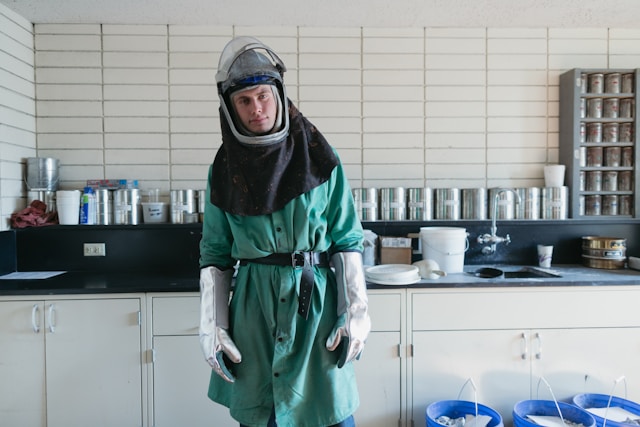
Safety awareness shapes how men navigate daily life, whether driving, working, socializing, or caring for loved ones. Taking proactive steps to reduce risks strengthens personal security and creates safer environments for families, friends, and communities. Understanding practical safety strategies equips men to respond effectively to emergencies, minimize accidents, and safeguard those around them.
Stay Physically Aware in Public Spaces
Remaining alert in public spaces prevents dangerous situations before they unfold. Men who stay aware of their surroundings notice suspicious behavior, potential hazards, or unsafe conditions early. Situational awareness includes scanning the environment, identifying exits, and avoiding distractions such as excessive phone use while walking.
Simple habits like making eye contact, walking confidently, and keeping valuables secure discourage potential threats. Awareness creates the opportunity to act before a problem escalates, whether that means crossing the street, seeking help, or stepping away from a dangerous scenario.
Know Your Legal Rights and Responsibilities
Understanding personal legal protections plays a crucial role in staying safe. Laws vary across states, and knowing how to respond during incidents involving accidents, altercations, or emergencies prevents legal complications. Consulting experienced injury attorneys in Florida gives men the knowledge and resources to handle unexpected situations effectively. Taking legal preparedness seriously strengthens both personal protection and accountability.
Each informed decision supports safer outcomes for everyone involved, whether during car accidents, workplace incidents, or public emergencies. Knowing rights and responsibilities reduces confusion during stressful moments and provides a foundation for sound judgment.
Practice Safe Driving Habits Daily
Driving remains one of the most common activities where safety decisions have immediate consequences. Consistently wearing seat belts, following traffic rules, and avoiding distractions protects both drivers and passengers. Responsible driving includes adjusting speed during poor weather, signaling turns clearly, and keeping a safe following distance.
Defensive driving techniques, such as anticipating the actions of others and maintaining escape routes, help prevent collisions. Making safety a daily habit reduces the risk of serious injuries and protects pedestrians, cyclists, and other drivers sharing the road.
Maintain Personal Health and Preparedness
Health directly affects the ability to respond to emergencies. Regular checkups, balanced diets, exercise, and adequate rest improve physical resilience. Stronger cardiovascular health and quicker reflexes increase the chances of avoiding or minimizing harm during unexpected events.
Carrying basic first-aid knowledge and supplies extends this preparedness further. Knowing how to control bleeding, treat burns, or perform CPR can save lives during critical moments. Personal preparedness empowers men to protect themselves and assist others when needed.
Prioritize Mental and Emotional Safety
Emotional well-being plays a key role in how individuals respond to stress and danger. Recognizing personal limits, seeking support when needed, and managing emotions constructively help maintain clear thinking during emergencies. Men who take care of their mental health make better decisions in high-pressure situations.
Practices such as mindfulness, therapy, or regular stress-relief activities contribute to stronger emotional stability. Maintaining mental balance creates space for thoughtful responses rather than impulsive reactions during conflicts or accidents.
Protect Loved Ones Through Education and Communication
Safety extends beyond personal responsibility. Teaching children, partners, or friends about safety practices amplifies protection across households and communities. Simple conversations about fire escape plans, road safety, emergency contacts, or online security make a significant difference.
Open communication ensures that everyone knows how to respond when emergencies arise. Encouraging shared responsibility reduces panic and confusion during crises. Leading through example reinforces the importance of safety for younger family members who often learn behaviors from observation.
Recognize High-Risk Situations Early
Many accidents and confrontations can be avoided through early recognition of risk factors. Crowded areas with poor lighting, aggressive behavior, intoxicated individuals, or unsafe working conditions signal potential danger. Identifying these signs early provides opportunities to create distance, seek help, or take preventive actions.
Learning basic self-defense techniques enhances this proactive approach. Self-defense focuses on awareness, de-escalation, and safe exits rather than aggression. These skills help men protect themselves and others without escalating conflicts unnecessarily.
Build a Culture of Safety at Work and Home
Workplaces and homes benefit when men contribute to building safety-focused environments. At work, this involves following protocols, reporting hazards, and supporting colleagues in maintaining safe practices. At home, it includes securing heavy furniture, checking smoke detectors, and storing dangerous tools or chemicals safely.
Regular safety checks and honest discussions about potential risks create cultures where everyone understands their role in maintaining well-being. This shared commitment reduces accidents and strengthens trust among coworkers, family members, and communities.

Men hold the power to influence their personal safety and the security of those around them through consistent, intentional actions. Staying aware in public spaces, knowing legal rights, practicing safe driving, and maintaining health form strong protective foundations. Prioritizing mental well-being, educating loved ones, recognizing risks early, acting responsibly in social settings, and promoting safety at work and home create safer communities. Awareness, preparation, and proactive choices transform everyday moments into opportunities to protect lives and build stronger, more secure environments for everyone.


